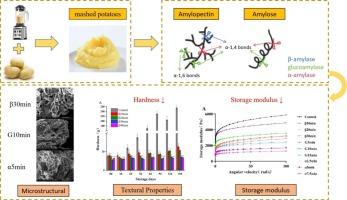通过酶解形式介导的多尺度结构修饰影响土豆泥的降解特性
IF 9.8
1区 农林科学
Q1 CHEMISTRY, APPLIED
引用次数: 0
摘要
淀粉逆变是指已糊化的淀粉在贮藏过程中发生再结晶,会导致马铃薯泥质地变硬和质量下降,从而缩短其保质期。为了缓解在常温下贮藏的马铃薯泥中的逆变现象,本研究调查了马铃薯淀粉在各种酶水解处理下的多尺度结构变化,旨在找出延缓逆变的最有效酶。结果表明,β-淀粉酶处理使马铃薯在长期贮藏过程中的硬度增加最少。30 分钟的 β 淀粉酶处理对抑制逆变最有效。相反,α-淀粉酶处理会导致过度水解,使土豆泥不适合进一步加工。葡萄糖淀粉酶处理组的淀粉短程有序结构显著增加,而其他处理则明显减少。与对照组相比,30 分钟的 β 淀粉酶处理使短程有序度降低了 49.09%,结晶度降低了 79.46%。本文章由计算机程序翻译,如有差异,请以英文原文为准。


Influencing the retrogradation properties of potato mash through multi-scale structural modifications mediated by enzymatic hydrolysis forms
Starch retrogradation, which involves the recrystallization of gelatinized starch during storage, causes texture hardening and quality loss in mashed potatoes, thereby reducing their shelf life. To mitigate retrogradation in mashed potatoes stored at ambient temperature, this study investigated the structural changes of potato starch at multiple scales under various enzymatic hydrolysis treatments, aiming to identify the most effective enzyme for delaying retrogradation. The results indicated that β-amylase treatment resulted in the least increase in hardness during long-term storage. The 30-min β-amylase treatment was the most effective in inhibiting retrogradation. In contrast, α-amylase treatment caused excessive hydrolysis, rendering the mashed potatoes unsuitable for further processing. The glucoamylase-treated group exhibited a significant increase in the short-range ordered structure of starch, whereas the other treatments showed notable reductions. The 30-min β-amylase treatment reduced short-range order by 49.09 % and crystallinity by 79.46 % versus controls.
求助全文
通过发布文献求助,成功后即可免费获取论文全文。
去求助
来源期刊

Food Chemistry
工程技术-食品科技
CiteScore
16.30
自引率
10.20%
发文量
3130
审稿时长
122 days
期刊介绍:
Food Chemistry publishes original research papers dealing with the advancement of the chemistry and biochemistry of foods or the analytical methods/ approach used. All papers should focus on the novelty of the research carried out.
 求助内容:
求助内容: 应助结果提醒方式:
应助结果提醒方式:


